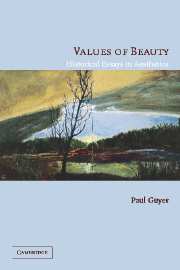2 - The Standard of Taste and the “Most Ardent Desire of Society”
Published online by Cambridge University Press: 05 June 2012
Summary
In his early essay, “Aesthetic Problems in Modern Philosophy,” Stanley Cavell considered the connection between the traditional problem of taste and his own fundamental question about what was then called ordinary-language philosophy: whence comes the authority of ordinary speakers, or even ordinary philosophers, to deliver authoritative pronouncements about the meaning of terms in their natural language? The basic idea of his answer to this question, which has been central to so much of his subsequent work, is that meanings are not like natural phenomena waiting to be discovered, but are constituted by the shared attunements of the speakers of the language, who thereby have an, as it were, legislative authority over their meanings – although of course, like other legislators, they are hardly infallible. He found a figure of this thought in Hume's idea of the critic, who does not just discover good taste but is part of the means whereby a community of taste can constitute itself: the critic is presented with some extant history of taste, to be sure, but “the critic's worth is not at the mercy of the history of taste”; rather, “his value to us is that he is able to make that history a part of his data, knowing that in itself, as it stands, it proves nothing – except popularity. His value to art and culture is not that he agrees with its taste – which would make him useful for guiding one's investments in the art market – but that he sets the terms in which our tastes, whatever they happen to be, may be protected or overcome.”
- Type
- Chapter
- Information
- Values of BeautyHistorical Essays in Aesthetics, pp. 37 - 74Publisher: Cambridge University PressPrint publication year: 2005
- 6
- Cited by

